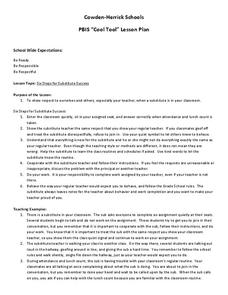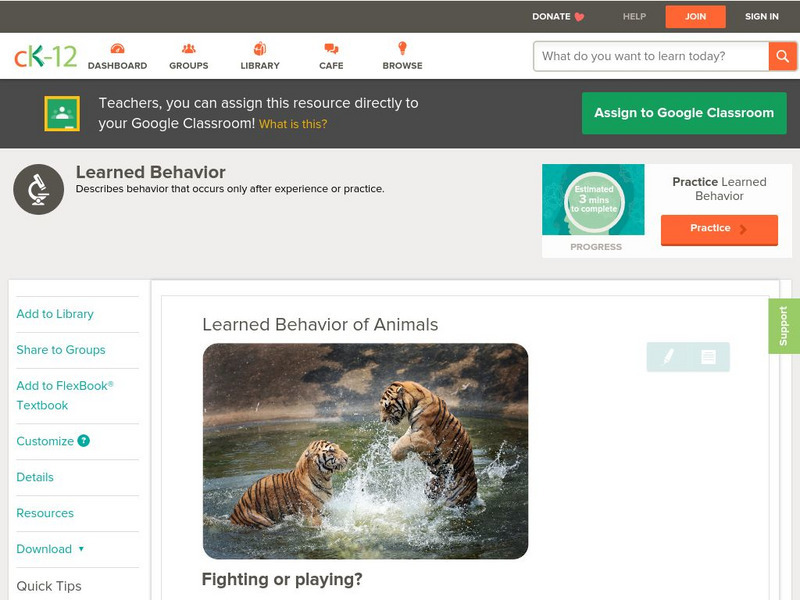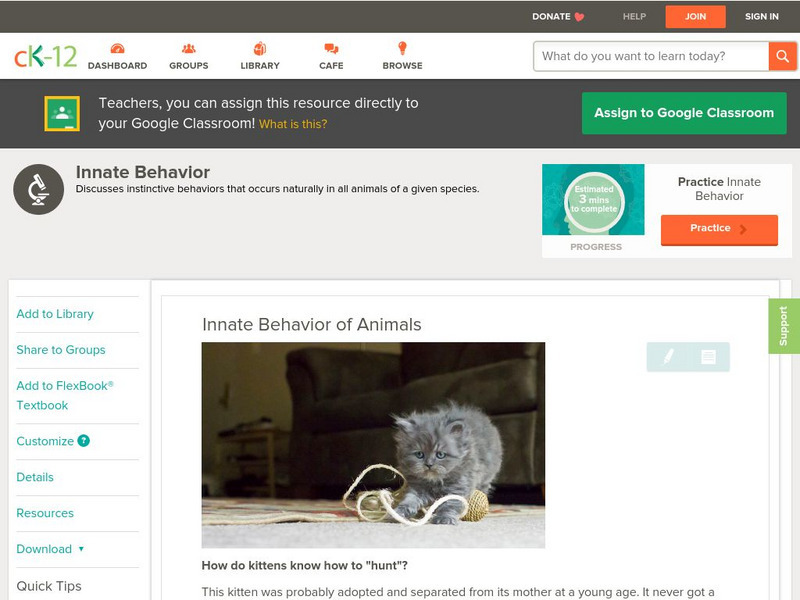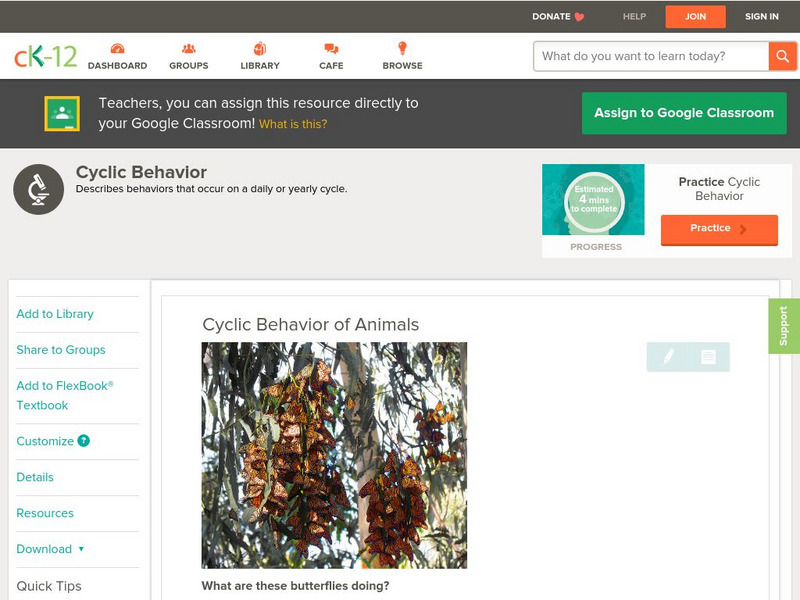Transforming Education
Self-Efficacy Toolkit
A PowerPoint presentation prepares instructors for teaching learners about self-efficacy, a key competency of social-emotional learning. The 29-page presentation is designed to give administrators and teachers a deeper understanding of...
Missouri Department of Elementary
R-E-S-P-E-C-T: A Basic Skill
Imagine seventh graders developing a school wide plan to promote respect in their school. That's the vision behind the second lesson in the R-E-S-P-E-C-T series. In preparation for designing a school-wide media campaign, class members...
Cowden-Herrick Schools
Six Steps for Substitute Success
Here's a switch--a lesson plan designed for prepare class members for a substitute! The plan highlights six behaviors that demonstrate respect and responsibility.
Transforming Education
Self-Management Strategies
What self-management techniques help scholars achieve their goals? Readers review a list of strategies for managing stress, increasing motivation, and setting goals. They discover how to monitor their emotions, create checklists to stay...
American Psychological Association
Developing Adolescents
Why to young people act the way they do? Scholars investigate the stages of adolescent development incorporating high school psychology techniques. Using research from the American Psychological Association, they uncover the five areas...
Washington Education Association
Preparing a More Useful Sub Plan for Your Substitute Teacher
Make your substitute's life easier by using the prompts on a one-page resource to a craft a profile of your classes and your daily routines. A great-first page for a substitute teacher folder.
CK-12 Foundation
Ck 12: Life Science: Learned Behavior of Animals
[Free Registration/Login may be required to access all resource tools.] Just about all human behaviors are learned. Learned behavior is behavior that occurs only after experience or practice. Learned behavior has an advantage over innate...
CK-12 Foundation
Ck 12: Life Science: 8.3 Learned Behavior
Understand different types of learned behavior among animals and humans.
CK-12 Foundation
Ck 12: Biology: Learned Behavior of Animals
[Free Registration/Login may be required to access all resource tools.] Describes types of behavior that animals can learn.
ArtsNow
Arts Now Learning: Super Gene [Pdf]
In this lesson, 5th graders learn about basic genetics and how genes can affect someone's behavior. They will write their own narrative about a character they create as a class in order to illustrate the effects of inherited traits and...
CK-12 Foundation
Ck 12: Life Science: Innate Behavior of Animals
[Free Registration/Login may be required to access all resource tools.] Many animal behaviors are ways that animals act naturally. They are not learned behaviors. Cats are natural-born hunters. They don't need to learn how to hunt....
PBS
Pbs Learning Media: How Animals Care for Their Young
In this interactive lesson, students learn that animals take care of their young in many of the same ways the adults in their lives take care of them.
PBS
Pbs Learning Media: How Animals Care for Their Young
In this interactive lesson, students learn that animals take care of their young in many of the same ways the adults in their lives take care of them. Students watch videos from NATURE and engage in a variety of activities to check...
ArtsNow
Arts Now Learning: Magic Rocks [Pdf]
In this lesson, young scholars work in groups with each acting as a predator, prey, or family member in a particular habitat. They present their habitat performance to the class and students identify the habitat and animal relationships....
CK-12 Foundation
Ck 12: Life Science: Cyclic Behavior of Animals
[Free Registration/Login may be required to access all resource tools.] Many animal behaviors change in a regular way. They go through cycles. Some cycles of behavior repeat each year. Other cycles of behavior repeat every day. Learn...
CK-12 Foundation
Ck 12: Life Science: Animal Behaviors
[Free Registration/Login may be required to access all resource tools.] Barking, purring, and playing are just some of the ways in which dogs and cats behave. These are examples of animal behaviors. Animal behavior is any way that...
CK-12 Foundation
Ck 12: Life Science: Social Behavior of Animals
[Free Registration/Login may be required to access all resource tools.] Why is animal communication important? Without it, animals would not be able to live together in groups. Animals that live in groups with other members of their...
Common Sense Media
Common Sense Media: Education: Lesson: Show Respect Online (K 2)
Students explore the similarities and differences between in-person and online communications, and then learn how to write clear and respectful emails. Requires free membership.
Common Sense Media
Common Sense Media: Education: Lesson: Follow the Digital Trail: K 2
Young scholars learn that the information they put online leaves a digital footprint or "trail." This trail can be big or small, helpful or hurtful, depending on how they manage it. Free membership required.
Common Sense Media
Common Sense Media: Education: Lesson: Super Digital Citizen: Grades 3 5
Learners explore what it means to be responsible and respectful to their offline and online communities as a step toward learning how to be good digital citizens. Students create digital superheroes who exhibit exemplary attributes and...
NBC
Nbc Learn: Chemistry of Water
This video/lesson series explains how the structure and behavior of H2O in liquid form gives water its properties, and make it a chemical essential for life. Also in this collection: a Victorian-era depiction of the water molecule; news...
PBS
Pbs Learning Media: Lesson 7: Rooting for Plants
This is the first lesson in the "Mostly Plants" section. Students are introduced to the amazing variety of plant-based foods and relate that to MyPlate, our national dietary guidance. Watching a clip from In Defense of Food and learning...
PBS
Pbs Learning Media: Lesson 6: Dia Beat It!
In this lesson students investigate the changing prevalence rates of type 2 diabetes and learn how this disease develops.
PBS
Pbs Learning Media: Lesson 5: Supersized
In this lesson plan, learners examine portion sizes and how our eyes, as well as food companies, may deceive us in estimating a healthy amount to eat. Through popcorn experiments, along with a clip from In Defense of Food, students learn...













